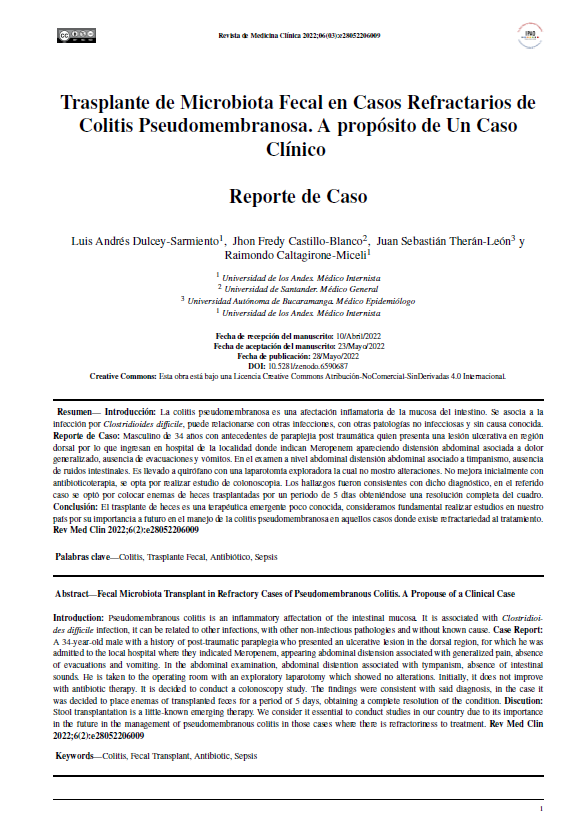Abstract
Introduction: Pseudomembranous colitis is an inflammatory affectation of the mucosa of the intestine, characterized by the formation of whitish plaques. It is associated with Clostridium difficile infection, it can be associated with other infections, with other non-infectious pathologies and without known cause. Case Report: A 34-year-old male with a history of post-traumatic paraplegia who presented with an ulcerative lesion in the dorsal region, so they entered the local hospital where they indicated Meropenem, abdominal distension appeared, associated with generalized pain, absence of stools and vomiting. In the cardiopulmonary examination without pulmonary or cardiac alterations, at abdominal level abdominal distension associated with tympanism, absence of intestinal noises, the rest of the normal physical examination. The hematology shows an important leukocytosis. The rest of the exams were normal. He was taken to the operating room with an exploratory laparotomy which showed no alterations. He is taken to the special care area where his pseudomembranous colitis is suspected, he does not improve initially with antibiotic therapy, he chooses to perform a colonoscopy study. The findings were consistent with this diagnosis, in the aforementioned case we chose to place stool enemas transplanted for a period of 5 days with a clinical benefit. Discussion: Stool transplantation is an emerging little-known therapy, we consider it fundamental to conduct studies in our country because of its importance in the future in the management of pseudomembranous colitis in those cases where there is refractoriness to treatment.
References
Schäffler H, Breitrück A. Clostridium difficile - From Colonization to Infection. Front Microbiol. 2018 Apr 10;9:646. doi: 10.3389/fmicb.2018.00646.
von Braun A, Lübbert C. [Treatment of acute and recurrent Clostridium difficile infections : What is new?]. Internist (Berl). 2018 May;59(5):505-513. doi: 10.1007/s00108-018-0401-x.
Chia JH, Wu TS, Wu TL, Chen CL, Chuang CH, Su LH, Chang HJ, Lu CC, Kuo AJ, Lai HC, Chiu CH. Clostridium innocuum is a vancomycin-resistant pathogen that may cause antibiotic-associated diarrhoea. Clin Microbiol Infect. 2018 Feb 17. pii: S1198-743X(18)30188-5. doi: 10.1016/j.cmi.2018.02.015.
Siddiqui J, Campion T, Wei R, Kuzmich S. Clostridium difficile enteritis: diffuse small bowel radiological changes in a patient with abdominal sepsis. BMJ Case Rep. 2018 Jan 26;2018. pii: bcr-2017-222209. doi: 10.1136/bcr-2017-222209.
Jessurun J. The Differential Diagnosis of Acute Colitis: Clues to a Specific Diagnosis. Surg Pathol Clin. 2017 Dec;10(4):863-885. doi: 10.1016/j.path.2017.07.008.
Viggars AP, Gracie DJ, Ford AC. Use of Probiotics in Hospitalized Adults to Prevent Clostridium difficile Infection: DownGRADE the Quality of Evidence?. Gastroenterology. 2017 Nov;153(5):1451-1452. doi: 10.1053/j.gastro.2017.05.067.
Salazar CL, Reyes C, Atehortua S, Sierra P, Correa MM, Paredes-Sabja D, Best E, Fawley WN, Wilcox M, González Á. Molecular, microbiological and clinical characterization of Clostridium difficile isolates from tertiary care hospitals in Colombia. PLoS One. 2017 Sep 13;12(9):e0184689. doi: 10.1371/journal.pone.0184689.
Lee S, Drennan K, Simons G, Hepple A, Karlsson K, Lowman W, Gaylard PC, McNamara L, Fabian J. The 'ins and outs' of faecal microbiota transplant for recurrent Clostridium difficile diarrhoea at Wits Donald Gordon Medical Centre, Johannesburg, South Africa. S Afr Med J. 2018 Apr 25;108(5):403-407. doi: 10.7196/SAMJ.2018.v108i5.12367
Dekker Nitert M, Gomez-Arango LF, Barrett HL, McIntyre HD, Anderson GJ, Frazer DM, Callaway LK. Iron supplementation has minor effects on gut microbiota composition in overweight and obese women in early pregnancy. Br J Nutr. 2018 May 23:1-7. doi: 10.1017/S0007114518001149.
The Fecal Transplant Foundation: Awareness and support for fecal microbiota transplant [sede web]. Indiana: The Fecal Transplant Foundation; 2018 [acceso 06/06/2018]. What is FMT. Available in: http://thefecaltransplantfoundation.org/ what-is-fecal-transplant/.
Drekonja D, Reich J, Gezahegn S, Greer N, Shaukat A, MacDonald R et al. Fecal microbiota transplantation for Clostridium difficile infection: a systematic review. Ann Intern Med. 2015; 162 (9): 630-638.
Vyas D, Aekka A, Vyas A. Fecal transplant policy and legislation. World J Gastroenterol. 2015; 21 (1): 6-11. Doi: 10.3748/wjg.v21.i1.6
OpenBiome [sede web]. Boston: Openbiome org.; 2016 [acesso 06/02/2016]. What is fecal microbiota transplantation? Available in: http://www.openbiome.org/about-fmt.
American Gastroenterological Association [sede web]. Bethesda (MD): American Gastroenterological Association; 2013 [acceso 06/06/2018]. Joint Society Letter to FDA - Current Consensus Guidance and Donor Screening and Stool Testing for FMT. Available in: http://www.gastro.org/research/ Joint_Society_FMT_Guidance.pdf.
Juul FE, Garborg K, Bretthauer M, Skudal H, Øines MN, Wiig H, Rose Ø, Seip B, Lamont JT, Midtvedt T, Valeur J, Kalager M, Holme Ø, Helsingen L, Løberg M, Adami HO. Fecal Microbiota Transplantation for Primary Clostridium difficile Infection. N Engl J Med. 2018 Jun 2. doi: 10.1056/NEJMc1803103
Cao Y, Zhang B, Wu Y, Wang Q, Wang J, Shen F. The Value of Fecal Microbiota Transplantation in the Treatment of Ulcerative Colitis Patients: A Systematic Review and Meta-Analysis. Gastroenterol Res Pract. 2018 Apr 3;2018:5480961. doi: 10.1155/2018/5480961.
Messias BA, Franchi BF, Pontes PH, Barbosa DÁAM, Viana CAS. Fecal microbiota transplantation in the treatment of Clostridium difficile infection: state of the art and literature review. Rev Col Bras Cir. 2018;45(2):e1609. doi: 10.1590/0100-6991e-20181609
McIntosh CM, Chen L, Shaiber A, Eren AM, Alegre ML. Gut microbes contribute to variation in solid organ transplant outcomes in mice. Microbiome. 2018 May 25;6(1):96. doi: 10.1186/s40168-018-0474-8.
Mizuno S, Nanki K, Kanai T. Nihon Shokakibyo Makai Zasshi. [Future perspectives on fecal microbiota transplantation].2018;115(5):449-459.doi: 10.11405/nisshoshi.115.449.
Gardiner BJ, Thorpe CM, Pinkham NV, McDermott LA, Walk ST, Snydman DR. A repeat offender: Recurrent extraintestinal Clostridium difficile infection following fecal microbiota transplantation. Anaerobe. 2018 Apr 21;51:68-72. doi: 10.1016/j.anaerobe.2018.04.007

This work is licensed under a Creative Commons Attribution-NonCommercial-NoDerivatives 4.0 International License.
Copyright (c) 2022 Revista de Medicina Clínica

